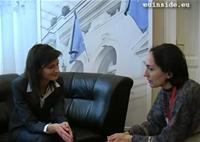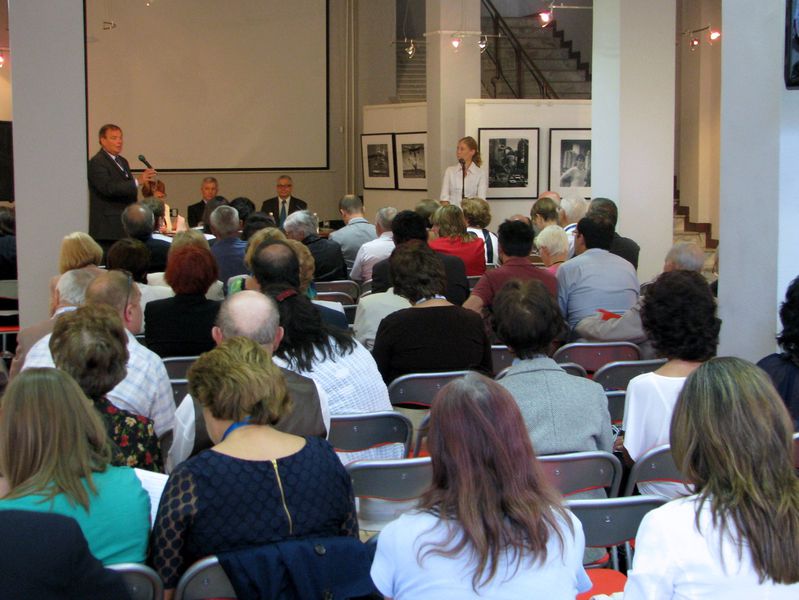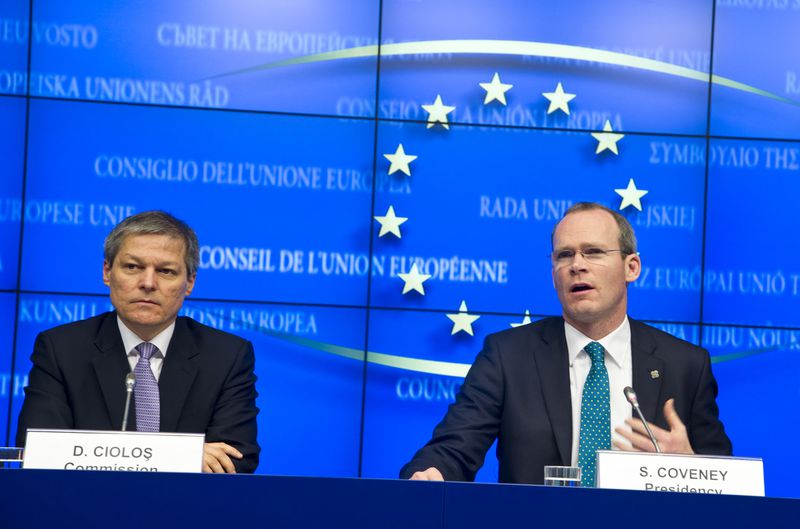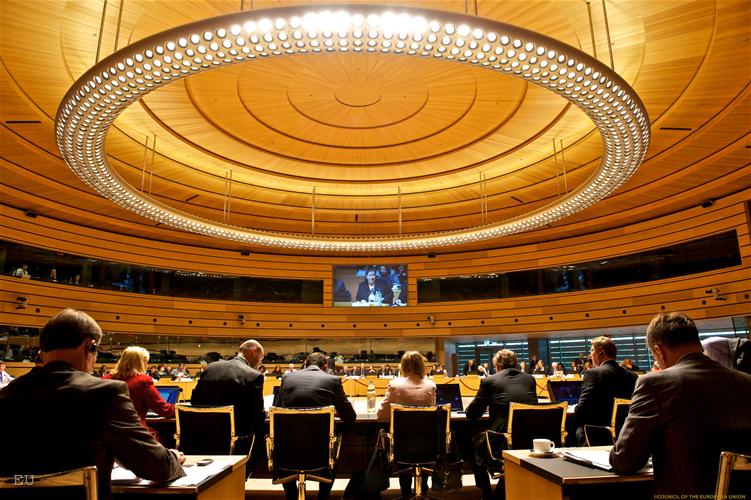"With the current policy, European farming cannot be competitive"
Adelina Marini, February 2, 2011
 The most favourable for Bulgaria would be the second variant in the proposals for reform of the Common Agricultural Policy (CAP), as presented in the European Commission's Communication on November 18th. This is what Mariya Nedelcheva said in an interview for euinside - an MEP from the European People's Party Group (GERB) and a member of the Agriculture and Rural Development Committee. We talked with her on another topic - the referendum for or against the division of Sudan into two separate states, as Ms Nedelcheva led the monitoring mission of the European Parliament in Sudan.
The most favourable for Bulgaria would be the second variant in the proposals for reform of the Common Agricultural Policy (CAP), as presented in the European Commission's Communication on November 18th. This is what Mariya Nedelcheva said in an interview for euinside - an MEP from the European People's Party Group (GERB) and a member of the Agriculture and Rural Development Committee. We talked with her on another topic - the referendum for or against the division of Sudan into two separate states, as Ms Nedelcheva led the monitoring mission of the European Parliament in Sudan.
A full text of the interview
euinside: The organisation that you are doing for these public debates is indeed great because, after all, 2014 is knocking on the door, but let me ask you about the Communication itself. It went through various changes until it had been published officially and, in fact, the proposals for reform of the Common Agriculture Policy (CAP) are three. The three are very different from one another. Which, do you think, is the best in terms of the policy in general; which is the best for us and which is the most realistic?
MARIYA NEDELCHEVA: Undoubtedly the final version went through significant changes as presented on November 18th, but it reflected the fierce debates we saw in the European Parliament in the last few months. From the proposed three variants I think the best for Bulgaria is the second one, which is a combination of two extremities. We insist for greater flexibility in CAP's application. We would like to keep its budget, we would like the structure of the two pillars to be kept - something which is very important for us because the direct payments are a guarantee for a direct access of farmers and the development of rural areas.
We have an enormous need these regions [the rural areas] in Bulgaria to become dynamic, to create jobs and to fight the negative demographic trends which we see and which are very worrying. So, what I think at this stage is that this is the consensus variant which would allow us to take the best from the current regulations and what actually works for Bulgaria, and in the meantime where we felt of being robbed and where there is injustice, to be able to take part in the definition of the new criteria so that we could defend our position better.
euinside: So you think that the second variant, the most consensus one, is also the most realistic in terms of being taken into account in the legislative proposal the Commission is about to prepare?
MARIYA NEDELCHEVA: Yes, I really think that it is the most realistic one because the other two are too extreme in parts of the reforms they envisage. They cause reactions among most of the member states, at least because in their current form they do not envisage a transition period that would allow member states to apply the new rules. It would be very difficult for any of us, the politicians, to explain to the people in our home countries that as of January 1st 2014 the rules will change and they might not be prepared for that by then.
euinside: By the way, the Communication pays significant attention to the international environment in terms of the Doha Round negotiations, according to which European agriculture has to be less subsidised and more competitive. This second variant and the need the Bulgarian agriculture to be still assisted, are they in conflict?
MARIYA NEDELCHEVA: No, I don't think they are in conflict because, according to this variant, we are keeping the first pillar where we have the stimulus of the direct financing that would help the Bulgarian agriculture. But on the other hand we cannot lag behind the common European trend and we have a chance with the second variant, the second pillar, our farmers to adapt and to be competitive. What is being said in the Communication is very important about the international environment and market place because, indeed, our farmers have to abide with very high requirements for quality of products, so we have to stimulate to the highest degree this market and I would like to draw your attention to another wish of ours in the Agriculture Committee, which for several months we are very actively raising and an amendment of mine has been approved just days ago. What we insist for is the import of third countries products to abide to the same quality requirements as ours. Let us say this directly - if we continue with the current policy the European agriculture cannot be competitive.
euinside: Given the discussions that are being held on the budget for the next multiannual financial framework, it is evident that Britain would pass its wish for at least freezing of the budget which, on the one hand, looks fine for the CAP because it means keeping its budget. But is there a risk?
MARIYA NEDELCHEVA: I think there is no risk as fas as I can tell from the current stage of the debates. Certainly Britain will try its best to achieve a reduction of the budget and it would be best for us if the budget is kept the way it is now. What is hopeful for me is that the majority of member states want the size of the budget to be kept and in the European Parliament the majority it very clear. Our main argument for keeping the budget unchanged, to which indeed Britain cannot respond to, is that more and more responsibilities are give to farmers - they do not produce food only. They also take care of the environment, they contribute to the dynamics of EU's territories. For all these responsibilities they need money so that they can realise them.
euinside: Last time when we spoke you mentioned that quite surprisingly Spain and Portugal were against the levelling of subsidies before the deadline set in the Accession Treaty of Bulgaria (which is 2016). Any developments on the issue?
MARIYA NEDELCHEVA: Talks still go on. The colleagues from Spain and Portugal would hardly change their positions. Which is why the support of the people in Bulgaria is so important, because we understand that when I talk to them and tell them that this is my personal position is different than telling them that all farmers stand behind me and that I have received this position from them. This is why, this tour of the country is very important so that we can identify the common ground and so that I can receive legitimacy when talking to difficult partners like Spain and Portugal who defend their personal positions only, and to convince them that we have to apply in practice the European solidarity. We have to prove that Bulgaria is a guarantor that this European solidarity would not be used for new frauds or for bad tackling of European issues, but that we will use it for real needs that would help us make the European farming competitive.
euinside: And a topic which would probably seem odd to our public and maybe we have to explain it. You led the Monitoring Mission of the European Parliament for the referendum in Sudan. First, would you please share you personal impressions and then tell us why Sudan is important to us, why should we care?
MARIYA NEDELCHEVA: Indeed I had the incredible honour to lead one of the historic missions of the European Parliament, related to EU's external relations. In Sudan there was a referendum which is very significant in itself as an event, because for the first time after the decolonisation a state border is being moved in Africa. What we have observed so far is that interested in these areas are countries - former colonisers, countries with strong economic interests. It is a very strong signal for the EU and for Sudan that Bulgaria is interested in them - a country non-coloniser, a new member state.
Thus we are sending a very strong and human message too, that in the Union's external policy Bulgaria has aimed at being an active participant. On the other hand, Bulgaria is not only a member of the EU, it also has its relations with other countries. So, these monitoring missions are very important because they are linked to the cornerstone of every election process and, on the other hand - in such missions with my active involvement Bulgaria shows a very different face from what, unfortunately, we are used to - EU funds fraud and whatever cliches, which we have to break and which we have to fight.
euinside: Is oil what the EU is interested in in Sudan or just to solve the problems of these people?
MARIYA NEDELCHEVA: First of all it is very important to protect human rights and democratic principles. Oil, if we have a look on the statistics, we will see that the EU is much behind in its economic relations with Sudan than countries like China, India, the US. What is important for the EU and for us has never been economic resources, but that we have always been carriers of principles like democracy, rule of law, respect for law, human rights and the second priority of ours is to create a real cooperation for projects for the development of these countries that would allow their societies to have a living and a worthy life. We are least interested in purely economic interests. If they are in a good combination with the political and social aspect of things - this is EU's strength. The EU has never been mercantile and will never be.
euinside: Thank you.
 | © Polish Embassy in Sofia
| © Polish Embassy in Sofia | © Council of the EU
| © Council of the EU | © EU
| © EU